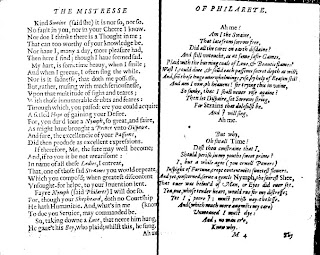
His what?
Reading for a seminar, and for the first time in years, all the shouty poems of Gerard Manley Hopkins, and find myself enjoying most the ‘Sundry Fragments and Images’, as they are so much less overpowering (and I concede that I’m a ‘Sundry Fragments’ type of reader).
Then, among the unfinished stuff, I came across a sonnet octave Hopkins wrote about Shakespeare:
In the lodges of the perishable souls
He has his portion. God, who stretch'd apart
Doomsday and death - whose dateless thought must chart
All times at once and span the distant goals,
Sees what his place is; but for us the rolls
Are shut against the canvassing of art.
Something we guess or know; some spirits start
Upwards at once and win their aureoles –
And at this point our poet’s pen faltered to a halt, as if riven by doubt– would Shakespeare in fact have made it to heaven? In Hopkins, heaven is a dismayingly exclusive sort of joint, and GMH did not have the benefit of Gary Taylor arguing Shakespeare’s Catholicism (which would have laid the troubling question to rest).
This reminded me of Boswell affecting to be bothered by the thought that (leaving aside the gloriously resurrected body of the bard himself) Shakespeare’s works might not be available in the here-beyond:
' BOSWELL. 'The hope that we shall see our departed friends again must support the mind.' JOHNSON. 'Why yes, Sir.' BOSWELL. 'There is a strange unwillingness to part with life, independent of serious fears as to futurity. A reverend friend of ours (naming him) tells me, that he feels an uneasiness at the thoughts of leaving his house, his study, his books.' JOHNSON. 'This is foolish in *****. A man need not be uneasy on these grounds; for, as he will retain his consciousness, he may say with the philosopher, Omnia mea mecum porto.' BOSWELL. 'True, Sir: we may carry our books in our heads; but still there is something painful in the thought of leaving for ever what has given us pleasure. I remember, many years ago, when my imagination was warm, and I happened to be in a melancholy mood, it distressed me to think of going into a state of being in which Shakspeare's poetry did not exist. A lady whom I then much admired, a very amiable woman, humoured my fancy, and relieved me by saying, "The first thing you will meet in the other world, will be an elegant copy of Shakspeare's works presented to you."' Dr. Johnson smiled benignantly at this, and did not appear to disapprove of the notion.
I assume that Dr Johnson is amused at Boswell’s affectation, and with the omission in the refined exchange Boswell so guilelessly reports of any thought that Old William himself might be all present and correct beyond the gates of pearl, his anecdotes 'more amusing than Pipit’s experience could provide'.
Alfred, Lord Tennyson, managed (it was reported) to pass away with a copy of Shakespeare in his hand. I found an elegy on Tennyson by Hardwicke Drummond Rawnsley, which starts like this, and gets as early as its second stanza to the exciting thought of Alfred and William hob-nobbing, bardically-bonded, among the blessed:
The moonlight lay with glory on his face
About whose bed in grief the nation bowed,
And darkly flew the wild October cloud:
Sobbed the pale morn, and came with faltering pace
As if it feared to lift a dead man's shroud;
And all the streams made lamentation loud.
But such majestic calm was in his look
As seemed to say, 'Why weeping o'er me bend,
Or bid me longer here on earth attend
Whose home is Heaven?' His hand held Shakespeare's book---
Shakespeare, so soon to greet him as a friend!
And so he went companioned, to the end.
“He died with his hand on his Shakespeare, and the moon shining full into the window, and over him”, Queen Victoria noted approvingly, but Christopher Ricks also cites Samuel Butler being waspish about this story: “his friends should have taken it out of the bed when they saw the end was near. It was not necessary to emphasize the fact that the ruling passion for posing was strong with him in death.”
I found at
http://www.alsopreview.com/octavo/fall2004/bielby.htm
a poet called
Some plough the earth, their feet of lardy flesh,
In love with earthly waywardness. Dare we
Not know what Incarnation means, not see
Love that breaks every bound? Soiled soil, afresh,
Leaps up in Christ. And those that live the thresh
Of blood and word in creativity,
Pity pied humankind and let it free,
Share Christ at each cross in that singing mesh.
He has fought shy of imagining the beatific bard – which would at least have been fun - and retreats into a generality which seems to suggest that poets are Christ-like, pitying and freeing ordinary humankind even despite their awful lardy feet, and suffering such an agony, the poor dears, in the act of composition.










